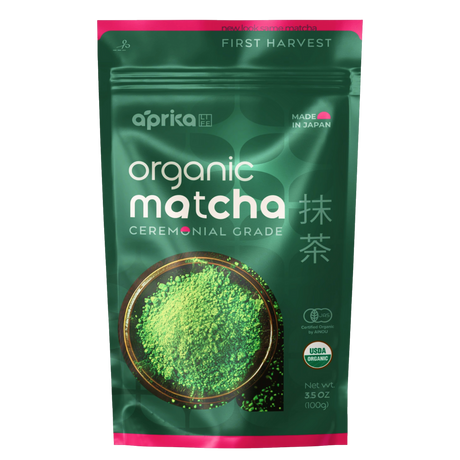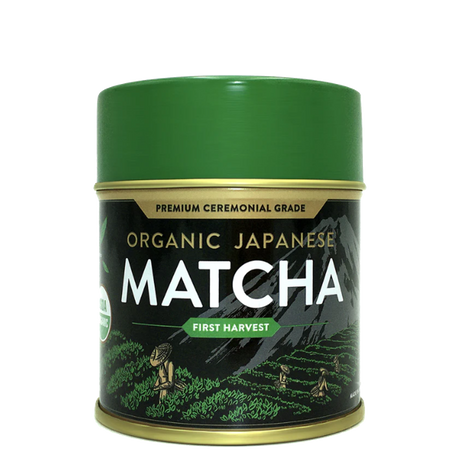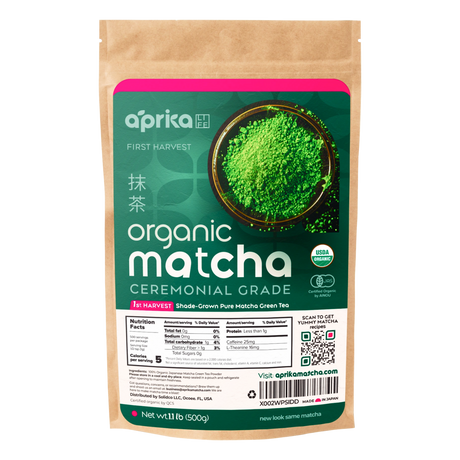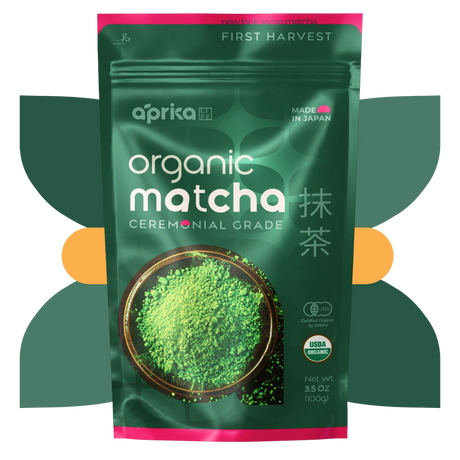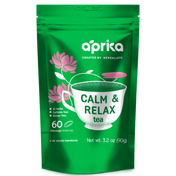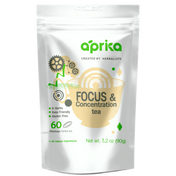Heart Health
From antioxidant-rich matcha to naturally calming herbal blends, our heart-friendly teas are crafted to support your well-being and fit easily into your everyday routine.
Organic Japanese Ceremonial Grade Matcha Green Tea Powder
Premium matcha for smooth, vibrant flavor
Regular price From $24.99Unit price /Unavailable100% Pure Peppermint Herbal Tea, 60 Bags
Cool, refreshing tea for digestion & clarity
Regular price $14.99Unit price /Unavailable100% Pure Chamomile Herbal Tea, 60 Bags
A single-ingredient tea for pure relaxation
Sale price $12.74 Regular price $14.99Unit price /Unavailable
Why Peppermint Tea Deserves a Spot in Your Heart-Healthy Diet
Peppermint tea offers a calm, soothing way to support overall well-being, and while its effects on heart health are more subtle than some other teas, it can still play a helpful role. One of its main benefits is stress relief. Peppermint is known for its calming properties, which may help relax blood vessels and support steady blood flow. Since chronic stress is closely tied to high blood pressure and cardiovascular strain, a daily cup of peppermint tea can offer support by helping the body unwind. It also contains natural anti-inflammatory compounds, like menthol and rosmarinic acid, which may help reduce internal inflammation linked to heart disease over time. Plus, being caffeine-free, it's a heart-friendly option for any time of day, especially in the evening when you're winding down.
Chamomile Tea for Stress Relief and Heart Support
Chamomile tea is best known for its calming effects, but it may also offer gentle support for heart health. Its stress-reducing properties can help lower cortisol levels and promote relaxation, both of which contribute to better vascular health over time. Chronic stress is a known risk factor for high blood pressure and heart strain, so finding small ways to unwind, like with a calming cup of chamomile, can make a difference. Chamomile also contains antioxidants such as apigenin, which may help reduce inflammation and oxidative stress, two underlying factors in heart disease. While it's not a direct treatment, adding chamomile tea into your daily routine can be a small, steady way to support your heart and overall well-being.
USDA and JAS Certified Matcha for Clean, Daily Wellness
Our ceremonial grade matcha tea is sourced directly from the tea gardens of Japan. Shade-cultivated for maximum nutrient retention, this matcha is both USDA and JAS certified, ensuring it's clean, responsibly grown, and free from unnecessary additives. Rich in antioxidant power like EGCG catechins, it supports heart health by helping reduce inflammation and oxidative stress. But its benefits go beyond the heart: matcha powder can help with focus, energy regulation, and a sense of calm alertness, thanks to its natural combination of caffeine and L-theanine. Whether you're starting your morning or resetting your afternoon, a daily matcha tea ritual brings a steady kind of clarity and care to your overall well-being.
100% Natural, Non-GMO Herbal Teas
Our herbal teas are crafted from 100% natural ingredients, carefully sourced from the fertile soils of the Carpathian Mountains. Cultivated with care and guided by expert herbalists, each blend reflects a commitment to purity and quality. Non-GMO, sugar-free, and gluten-free, these teas offer a wholesome, clean experience that supports your well-being.
Frequently Asked Questions
How often should I drink matcha for heart health benefits?
How often should I drink matcha for heart health benefits?
For heart health benefits, drinking matcha green tea powder regularly, about 2 to 3 cups a day, is a good guideline. This allows you to enjoy a steady intake of antioxidants like EGCG, which help reduce inflammation and support healthy cholesterol levels. However, it's important to listen to your body and avoid consuming excessive amounts, as matcha green tea does contain caffeine. Incorporating matcha into your daily routine alongside a balanced diet and active lifestyle can contribute to long-term cardiovascular wellness.
What does USDA and JAS certification mean for matcha quality?
What does USDA and JAS certification mean for matcha quality?
USDA and JAS certifications are important markers of quality and purity for matcha powder. The USDA Organic certification ensures that the matcha green tea leaves are grown without synthetic pesticides, herbicides, or fertilizers, following strict organic farming practices in the United States. Similarly, the JAS (Japanese Agricultural Standard) certification guarantees that the matcha tea meets Japan's strict organic standards, covering everything from cultivation to processing. Together, these certifications confirm that the matcha green tea is clean, responsibly grown, and free from harmful chemicals, giving you confidence in the quality and safety of every cup.
What are the health benefits of herbal teas?
What are the health benefits of herbal teas?
Herbal teas offer a wide range of health benefits thanks to their natural ingredients and bioactive compounds. They can help support digestion, reduce inflammation, and promote relaxation, making them great for stress relief and better sleep. Many herbal teas are rich in antioxidants, which support overall immune function. Being naturally caffeine-free, they provide a soothing way to stay hydrated throughout the day. With options for different needs, whether calming, energizing, or detoxifying, herbal teas make a versatile and nourishing addition to your daily wellness routine.
What does non-GMO mean for herbal teas?
What does non-GMO mean for herbal teas?
Non-GMO means that the herbal teas are made from plants that have not been genetically modified through laboratory techniques. This ensures that the herbs are grown naturally, which many people prefer for health, environmental, and ethical reasons. Choosing non-GMO herbal teas means you're enjoying blends that stay true to their natural origins, free from genetically engineered ingredients, and often grown with greater care for the environment.
Additional Collection Information
Additional Collection Information
More About Teas For Heart Health
Our ceremonial grade matcha comes directly from Japan’s tea gardens, carefully cultivated in the shade to preserve its complete nutrient profile. Packed with antioxidants, particularly EGCG catechins, it supports heart health by helping reduce inflammation and oxidative stress. Every batch is USDA and JAS certified, ensuring that it is responsibly grown, clean, and free from unnecessary additives, giving you a high-quality, health-conscious tea experience. Unlike regular green tea, matcha is made by whisking the whole powdered leaf into water, which means you get the full benefits of the leaf in every cup. Beyond cardiovascular support, this matcha can help improve focus, regulate energy, and promote a sense of calm alertness thanks to its natural combination of caffeine and L-theanine, making it an ideal choice for mornings, afternoons, or any moment you want clarity and steadiness.
The herbal teas in this collection are also curated with a focus on heart-friendly, stress-relieving benefits. Made from 100% natural ingredients sourced from the fertile soils of the Carpathian Mountains, these teas are crafted under the guidance of expert herbalists to ensure purity and quality. Non-GMO, sugar-free, and gluten-free, they provide a wholesome experience without compromise. Peppermint tea offers a gentle way to support cardiovascular health by helping relax blood vessels and promote steady blood flow, while also providing natural anti-inflammatory compounds. Chamomile tea is known for its calming properties, reducing stress and cortisol levels, which contribute to healthier blood pressure and overall heart support over time. Both teas are caffeine-free, making them suitable for any time of day, especially evenings when winding down is essential.
This combination of matcha and herbal teas creates a complete daily wellness routine. Ceremonial matcha delivers rich antioxidants and steady energy, while peppermint and chamomile offer support for relaxation and cardiovascular health. Each cup is crafted from clean, natural ingredients and thoughtfully sourced, providing everyday benefits that easily fit into a daily tea ritual focused on heart health, stress relief, and overall well-being.
Matcha for a Healthier Heart: Daily Benefits You Can Feel
Matcha is known for its vibrant green color and clean taste, but it also offers a range of heart health benefits that make it more than just a daily ritual. At the core of matcha's strength is its high concentration of antioxidants, especially a catechin called EGCG (epigallocatechin gallate). This compound has been studied for its potential to lower LDL (bad) cholesterol, reduce blood pressure, and improve blood vessel function, all of which support long-term cardiovascular health.
Matcha may also help protect the heart by reducing oxidative stress and inflammation, two factors closely linked to the development of heart disease. Unlike regular green tea, where the tea leaves are steeped and discarded, matcha green tea is made by whisking the whole tea leaf powder into water, which means you get more of these heart-beneficial compounds in your daily intake.

